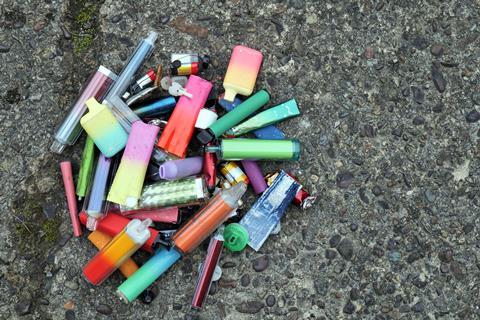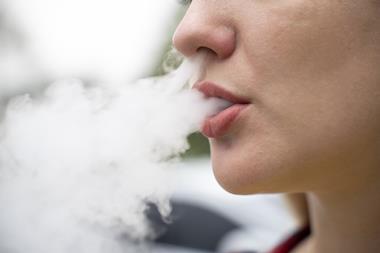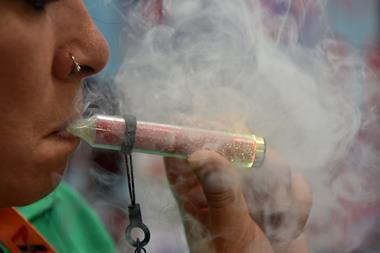Shop shelves stacked high with nearly every colour and flavour of disposable e-cigarettes have become a common sight in the UK’s town centres. But from 1 June 2025, single-use vapes will be illegal to sell across England, Wales, Scotland and Northern Ireland.
The UK is not the first country to ban disposable vapes. Last year, the Australian government banned the import of all disposable vapes into the country, while this year Belgium became the first EU country to ban the sale of disposable vapes. In February 2024, the World Health Organization (WHO) reported that 34 countries had banned the sale of e-cigarettes entirely.
Environmental impact, the use of critical resources like lithium, and health concerns surrounding the rise in young people vaping are all factors that have contributed to the UK’s new legislation.
What kinds of vapes are being banned?
The ban is targeting vapes that are designed to be purchased, consumed and disposed of without refilling or recharging.
Under the new rules, for a vape or e-cigarette to be legally sold in the UK, it needs to be both rechargeable and refillable. Vapes can qualify as refillable if they have tanks or cartridges that can be topped up with e-liquid, or if they use pre-filled pods that can be bought on their own. If the vape uses a coil, replacements must be available to buy and easily replaced by an average user.
What are the environmental issues associated with single-use vapes?
‘The main driver behind this policy under the single-use plastics legislation is to reduce the environmental burden of these products,’ explains Hazel Cheeseman, chief executive of Action on Smoking and Health (ASH), a public health charity that works to end the harm caused by tobacco.
According to a 2022 report commissioned by Material Focus, a not-for-profit that campaigns to improve the recycling of electrical products, more than 1.3 million single-use vapes are thrown away each week in the UK. With each vape containing an average of 0.15g of lithium in its battery, over 10 tonnes of lithium are being discarded every year – enough for the batteries inside 1200 electric vehicles. Beyond lithium, rarer elements including niobium, antimony, and tungsten are also present in many of the disposable vapes lost to landfills.
Due to the materials in their batteries, improperly disposed of vapes pose a risk to workers, as they can cause explosions or fires in bin lorries, waste management facilities or landfills. Toxic elements including mercury, lead and arsenic can be found in many vapes and could enter the environment if disposed of incorrectly. The plastic outer shells of disposable vapes also break down into microplastics that can damage ecosystems.
Legally, businesses selling vapes must offer a takeback service for vapes and their parts to allow customers to safely recycle them and could face punishment if they do not. However, in 2024 Material Focus found that only about a third of specialty vape retailers, and nearly no high-street retailers or convenience stores offered the service.

What are the health implications of vaping?
While generally considered less dangerous than smoking, vaping still carries significant health risks, and can quickly lead to nicotine addiction. Due to their relatively new nature, experts are concerned that the full effects of e-liquids on health aren’t yet known.
According to ASH, roughly 1 in 10 adults (around 5.6 million people) across England, Scotland and Wales vape, more than half of whom are former smokers. About 8% of people who vape have never been smokers. In England, one quarter of 11–15 year olds have tried vaping and 9% do it frequently.
Since disposable vapes entered the UK market, there has been a steep rise in their popularity. The proportion of vapers who use single-use products rose from 2.3% in 2021 to 31% in 2023, and they’re particularly common among young people – more than half of children aged 11–17 who vape use disposable ones.
What will the penalties be?
Possessing a single-use vape will not be illegal after 1 June 2025. However, UK businesses, including online shops, or individuals found selling, or possessing with the intent to sell, single-use vapes after 1 June 2025 will be fined and could face prison time for repeat offences. Any existing stock of disposable vapes that sellers may have cannot be sold after the ban comes into effect.
Are experts supportive of the ban?
While some experts were initially concerned with the potential impact of a disposable vape ban on those trying to quit smoking cigarettes, the number of new compliant, and equally priced, replacements has quelled those fears. ‘If a disposable ban moves people towards smoking, that could have massive impacts on public health,’ explains Eve Taylor who researches the effects of non-cigarette tobacco at University College London. However, she adds that other products that are currently available ‘are probably still going to fill that point of disposable vapes … so hopefully we don’t see people switching back’.
It remains to be seen whether limiting consumers to refillable vapes will have the environmental benefits the government is hoping for. ‘It depends on if [consumers] just treat them as disposables or not, but it’s a little bit too soon to know,’ explains Taylor. ‘There is a question mark over whether it will really result in a changing consumer behaviour,’ echoes Cheeseman.
Given the similar price points, marketing, branding and place of sales of the new compliant vapes, there are also doubts about how the ban will affect youth vaping. ‘It’s not the disposableness of the vapes that makes them appealing to teenagers,’ explains Cheeseman. ‘They don’t like them because you can chuck them away. They like them because they’re nice colours, because they’re tactile, because of the way that they’re promoted, because of their availability, because of their price – and none of those things have changed.’
Both Cheeseman and Taylor point to the tobacco and vapes bill, which is currently progressing through parliament, as having more potential to achieve the environmental and public health benefits that the single-use vape ban is aiming for. The bill, which includes a provision prohibiting the sale of tobacco to people born from 2009 onwards, aims to give the government more regulatory power over tobacco and vape products, including how they’re advertised, sold and consumed, with the aim of creating a smoke-free UK.

















No comments yet